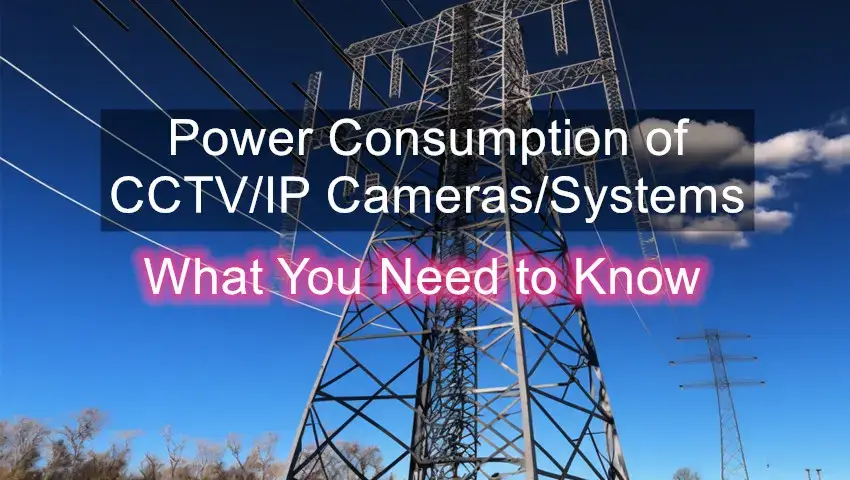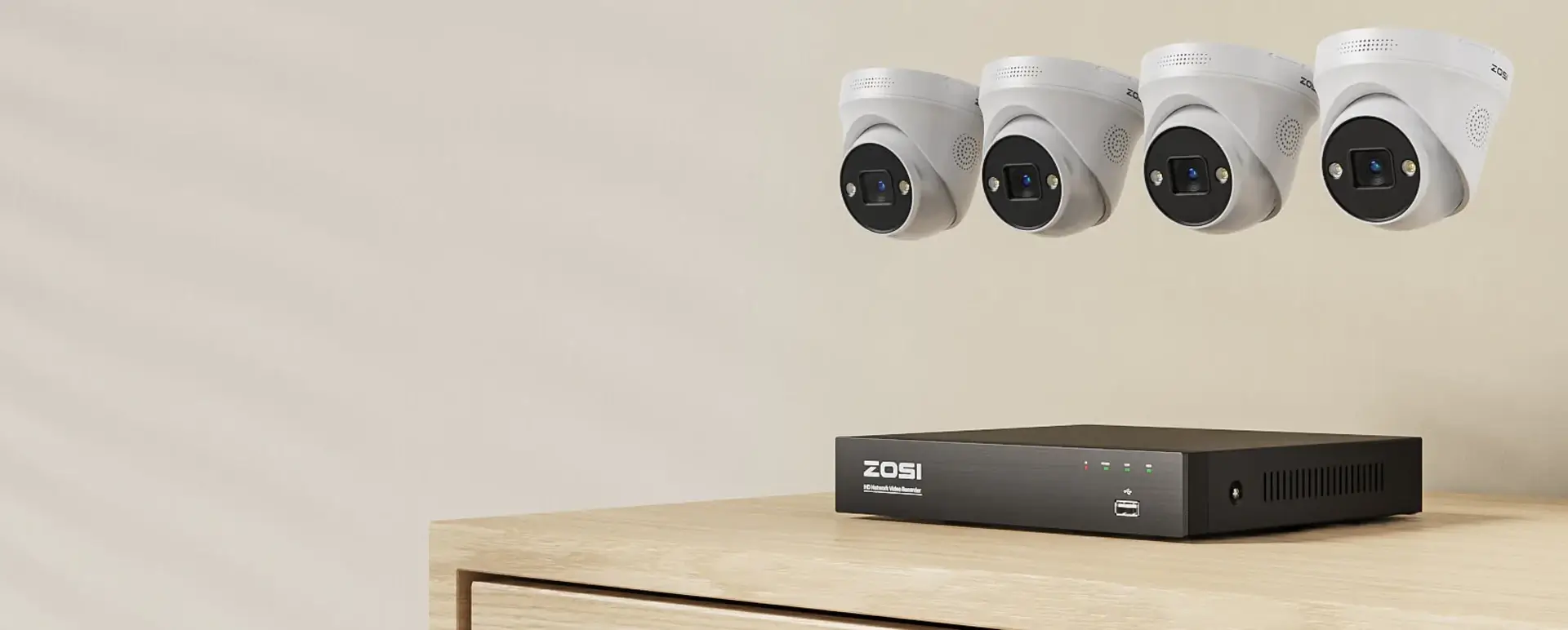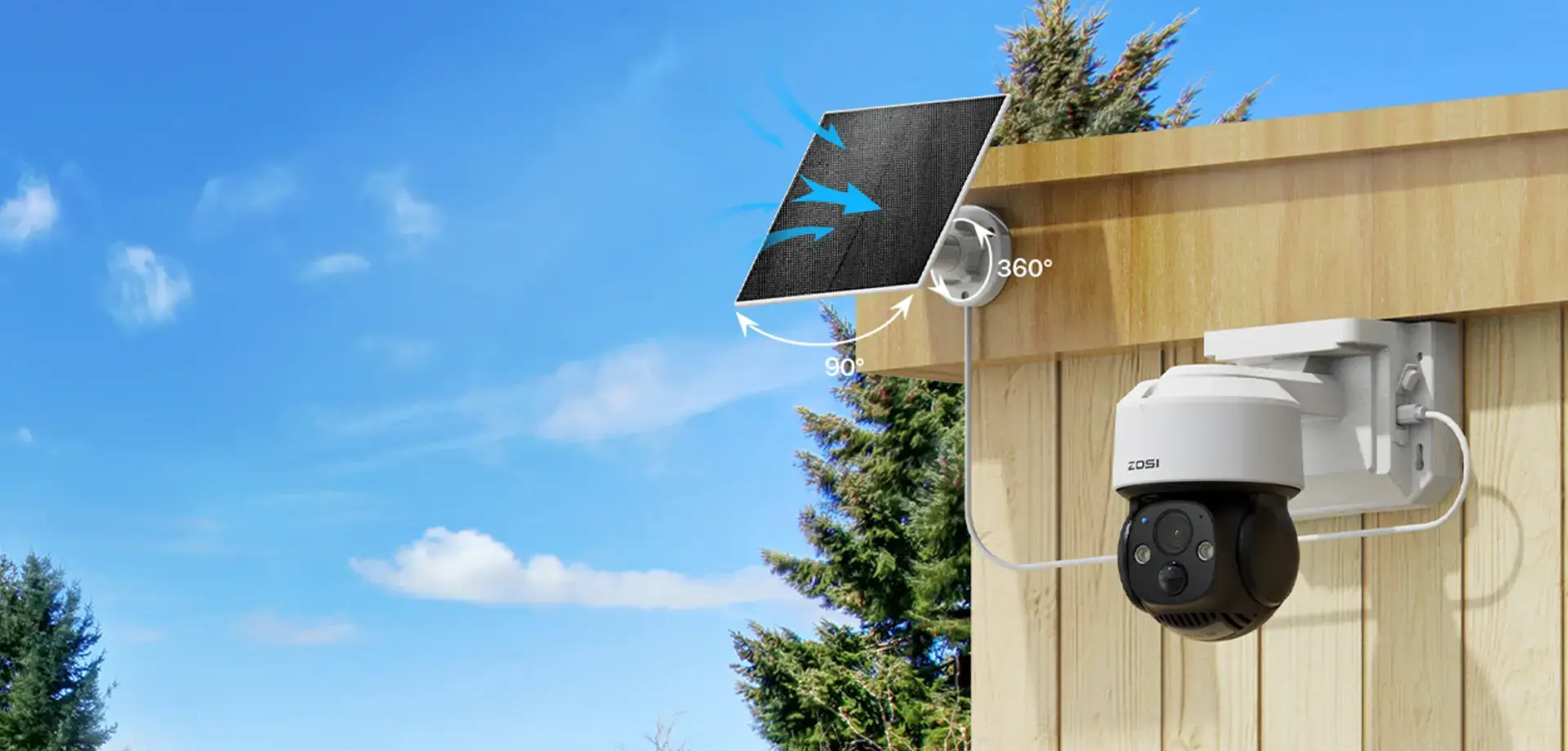Power consumption is an essential factor to consider when setting up a CCTV/IP security system. A security system that is continuously monitoring consumes electricity, and the energy consumed can add up over time.
In this post, we will discuss the power consumption of CCTV/IP cameras/systems and what you need to know about it. We will cover various aspects of power consumption, such as how to calculate the energy consumption of your security cameras, how much power DVR/NVR systems use, and how to reduce the energy consumption of your security systems. Understanding the power consumption of CCTV/IP cameras/systems can help you choose the right security cameras and configure them to minimize energy consumption.
Contents
How Much Power Do Security Cameras Use?
Understanding how much power your security cameras use is important in determining the impact they have on your energy bill. Security cameras typically consume very little power, but the exact amount will depend on several factors, such as the type of camera, its features, and how it is connected to the power source.
Some cameras may have power consumption specifications listed in their manuals or on their product pages, while others may only list information about the power supply. In the latter case, you can calculate energy consumption by multiplying the voltage by the camera’s amperage, or by using a device like a Kill A Watt to measure power consumption directly.
It’s important to note that different features, such as IR illumination night vision or pan-tilt, may increase a camera’s power consumption by a few watts. Additionally, PoE security cameras may require a PoE switch or injector, which can add to their power consumption. A piece of advice, choose PoE switch carefully by estimating the maximum power draw per device and the number of PoE cameras.
Overall, however, security cameras are not major energy consumers like other gadgets such as computers or toasters.
Does DVR/NVR Use a Lot of Electricity?
DVRs (Digital Video Recorders) and NVRs (Network Video Recorders) are essential components of any security camera system, used for recording and storing footage. While they may use slightly more power than individual cameras, they are still not significant energy consumers.
DVR/NVR Power Consumption: Most DVRs and NVRs use between 10 and 60 watts of power, depending on the model and features. For example, a typical Hikvision DVR uses 40 watts of power at maximum capacity, while a Dahua DVR uses up to 60 watts.
24/7 Monitoring: Continuous monitoring with DVRs or NVRs can lead to increased power consumption, so it’s essential to choose a model that fits your needs and is energy efficient.
Overall, while DVRs and NVRs do use more power than individual cameras, their consumption is still relatively low, and they are not costly to run in the long term. However, if you want to reduce power consumption further, you can consider using energy-saving settings or solar-powered options.
How to Reduce Cost Running CCTV/IP Home Security Cameras/Systems
While security cameras and systems are not energy-hungry, their power consumption can add up over time. Fortunately, there are several measures you can take to reduce the amount of power your CCTV/IP cameras and systems use:
A. Buy Reliable Security Cameras
Investing in reliable security cameras will not only help reduce the amount of power they consume but also ensure that they last longer. High-quality cameras will use less energy and perform better over time, saving you money in the long run. Look for trusted brands that have good reviews and a proven track record, such as ZOSI. ZOSI offers a range of CCTV/IP cameras and systems with low power consumption, making them an energy-efficient choice for home security. When buying reliable security cameras, it’s important to balance cost with quality and energy efficiency.
C225 - 4K POE Surveillance Cameras Security Monitor Systems
- 4K Ultra HD
- Smart Person/Vehicle Detection
- Customize Detection Zone
- Starlight Night Vision
- 24/7 Video & Audio Recording
- Access Remotely & Flexibly
- Two Way Audio
B. Use Quality Wires and Cables
The quality of the wires and cables used to connect your cameras can have a significant impact on their power consumption. Low-quality cables can cause signal loss, which in turn can cause your cameras to use more power to maintain a connection. Using high-quality cables will ensure that your cameras are receiving a steady signal, reducing the amount of power they need to use.
C. Tweak Your Camera Settings
One of the most effective ways to reduce the power consumption of your CCTV/IP cameras is to customize their settings. For example, you can reduce the frame rate or resolution of your cameras to use less power. You can also set them to only record when motion is detected, further reducing their power usage.
D. Consider Solar-Powered Cameras
If you are looking for a more environmentally friendly option, solar-powered security cameras are an excellent choice. These cameras use renewable energy to operate, reducing your carbon footprint and saving you money on your energy bill.
When considering solar-powered cameras, one option to consider is the ZOSI 1NC-291 with solar panel. This camera is designed to work with solar panels, making it an energy-efficient option for those looking to reduce their power consumption. The 1NC-291 is a high-definition camera that is easy to install and comes with a motion sensor and night vision capabilities. It also has a long battery life and is weather-resistant, making it ideal for outdoor use. If you’re looking for a reliable and energy-efficient solar-powered camera, the ZOSI 1NC-291 is definitely worth considering.
4MP Wireless Battery Powered PT Secrity Camera - 1NC-291
- 4MP Super HD
- Long Battery Life
- Customize PIR Alert
- 360° HD View
- Flexible Mounting
- Enhanced Night Vision
Overall, taking these measures to reduce the power consumption of your CCTV/IP cameras and systems can help you save money and reduce your impact on the environment.
Conclusion
In conclusion, the power consumption of CCTV/IP cameras and systems is not something that should be overlooked. While they may not consume as much energy as other household appliances, their impact on your electricity bill can add up over time.
To reduce the cost of running your security system, it’s essential to choose reliable cameras, use quality wires and cables, and customize the settings to save power by using motion detection. Solar-powered cameras, like the ZOSI 1NC-291, are also an excellent option for reducing power consumption.
By taking these small steps, you can not only cut down on energy spending but also reduce your carbon footprint in the long run. So, make sure to keep the power consumption of your security cameras and systems in mind when setting up or upgrading your home security.







